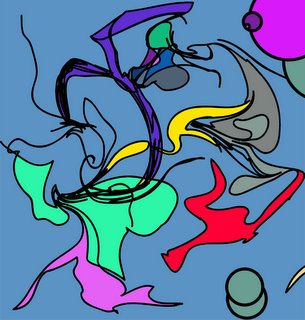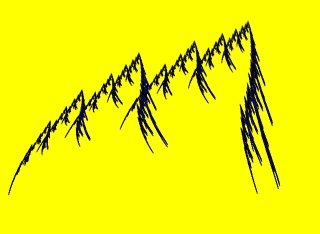Original Thought vs. First Thought
Subtitled: The Coincidence of Language.
(Caution: prepare yourself for an 'unusual' read! You have been forewarned!)
__________________________________________________
“Two babies were born on the same day at the same hospital. They lay there and looked at each other. Their families came and took them away. Eighty years later, by a bizarre coincidence, they lay in the same hospital, on their deathbeds, next to each other. One of them looked at the other and said, so. What did you think?” - Steven Wright
"Coincidences are spiritual puns." - G.K. Chesterton "Schwenk did not believe in coincidence. He believed in universal principles, and, more than universality, he believed in a certain spirit in nature that made his prose uncomfortably anthropomorphic. His 'archetypal principle' was this: that flow 'wants to realize itself, regardless of the surrounding material.' " - pp. 197-198, "Chaos: A New Science" by James Glieck.
"Schwenk did not believe in coincidence. He believed in universal principles, and, more than universality, he believed in a certain spirit in nature that made his prose uncomfortably anthropomorphic. His 'archetypal principle' was this: that flow 'wants to realize itself, regardless of the surrounding material.' " - pp. 197-198, "Chaos: A New Science" by James Glieck.
"It's an experience like no other experience I can describe, the best thing that can happen to a scientist, realizing that something that's happened in his or her mind exactly corresponds to something that happens in nature. It's startling every time it occurs. One is surprised that a construct of one's own mind can actually be realized in the honest-to-goodness world out there. A great shock, and a great, great joy" - Leo Kadanoff, also quoted from "Chaos: A New Science", p. 189.
I don't find these two quotes surprising at all, for if there is a universal order, (and there must be, for a partial system cannot exist without its other part) then mankind is a part of that order, as is his mind. "Out there" is simultaneously "in here". Why should one be surprised if the mind is consciously aware of its own existence in another form?
I read the above two quotes last night (Apr 21, 2006) a day after I had written this blog about Coincidence and Similitude, and the evening of the same day when I assembled this one about Original Thought.
The pattern that I am observing in my own thinking is that I more and more frequently think of thoughts and thoughtlines just prior to reading similar thoughts expressed by someone else who was thinking them in the past, and then chose to record them in written form. Does this demonstrate some latent capacity I have for foretelling, or does it offer some evidence of the unfolding of original thought in its many disguises and shape-shifted formats, all stemming from one, single first thought? Or, as would fit with the predictions and predelictions of 'is', is it both? Does it only apply to me? Is it universal? Can it be harnessed? What are its attributes and characteristics, if the assumption is made that all this is, indeed, at least possible, if not fact?
What evidence do I have of any of this except my own word. I could play a clever word game and say I have EVYDENSE, and it is my own word. Or is that perhaps more than a simple clever bit of wit? Some cunning punnery? When I chose that name for my blog over a year and a half ago, even though I've only been keeping entries since January of this year, did I know I'd be writing this blog today? Does that make a case for determinism, for fatalism, or for 'is'?
Is this but clever wit,
Or a bit of clever intuit?
I must look into it
And See.
See is the seed of seed, which 'is' allows to birth itself.
Seed can birth see, or vision of the seed.
See?
Poets play with words, but beyond play, they art words. And the art they poet often is more precise than the clearest scientific dissertation could attempt to achieve. "Scientific problems are expressed in the available scientific language. So far, the twentieth century's best expression of Libchaber's intuition about flow needed the language of poetry" (P. 196 ibid.).
We use a numerical system of 10 digits and a collection of operators to manipulate mathematical constructs, some of which are measurable and quantifiable, some of which are imaginary and unpredictable. We use a language system of 26 letters (I'm restricting my discussion set to English), and form words, sentences and paragraphs and poems, some of which are logical, some of which are sensible, some of which are challenging and some of which are esoteric.
In a language we assign pronunciations to the letters, but no meaning or value. We declare definitions to groupings of letters (called 'words'), sometimes more than one definition to the same distinct grouping, thereby frequently creating ambiguity. We assign meaning to groups of words in the form of context and complexity. Surely enough, there are mechanistic rules for creating or breaking down the grammar of a sentence, but there are no such rules for quantifying the exotic value of context and meaning.
I question why that is. I clearly see patterns within words and their context that are explained neither by the rules of grammar nor the analysis of a literary critic. And why shouldn't there be such a pattern? We are totally comfortable with numeric patterns, and artistic (or drawing) patterns. Why not linguistic ones too? After all, it is the most common and frequent way we choose to communicate with each other, and spend a great deal of time bemoaning things like "Women are from Venus, Men are from Mars", "Walk a mile in my mocassins before you judge me", ""It all stemmed from a misunderstanding in the first place.".
We're recognizing two things with that kind of statement. We don't understand each each other. We're not communicating our misunderstandings in a way that clears them up and makes them go away. And all that happens at the day-to-day soap opera level of living. What if there was a code, an interpretation, a consistency to the way words were formed, what letters chosen, what flow and form existed that let us examine speech, language, evolution and development from a different perspective. Is there any harm to it? Is there any conceivable believability factor, even remotely? Could it be the "Da Vinci Code" equivalent of unlocking evolution of thought as expressed and captured verbally (i.e. through a constructed language?).
I believe so. I have evolved such a system. I have begun to construct a definition-free language in which each word ('is'-WORD) represents it's context rather than it's meaning. I have been noticing that many of these words, as I assemble them in their completeness, also include (encapsulate) the inner set of rules of letter-shape construction.
I feel desperately brave to be writing this and putting it into a public space. It clearly smacks (on the surface) of the bizarre over-imagination of a wordsmith gone wild at best, and the inarticulate meanderings of a madman whose brain is dysfunctional at worst.
Or neither.
In either case
it appears to be
clever.
Or cleverer
than
mere clever
would intuit.
intuition is
the pay for
education
the cost of which
is in
tuition.
if you STAND UNDER
what is OVER YOUR HEAD
you will UNDERSTAND
it in YOUR HEAD.
then you will BE AHEAD
of where YOUR HEAD WAS
when it STOOD UNDER
what it did NOT-UNDERSTAND.
{UNDERSTAND.......NOT-UNDERSTAND}
I see these patterns when I read. I borrowed "Alice in Wonderland" and "Through the Looking the Glass" the other night from a friend, because I remember being told that Lewis Carroll wrote with a sub-level of writing in these stories. A similar, but different implementation of the concept is in a series like "The Simpsons", which simultaneously has a children's interpretation of innocence, and an adult interpretation that isn't.
So, do I see word play, or word work,
would work, or words worth?
How does one explain something that no one else is willing to understand?
(assume each line is written on a separate, sequential page).
This
is
a
sentence.
Th
is (pause --- repeat)
one
too.
This is one, two.
'This'
is a sentence?
I thought 'this' was a word.
'What' is a sentence.
I thought 'this is a sentence'.
What 'is' this
therefore.
Four where?
In jail.
A sentence is four in jail.
Or is it against in jail?
I am against injustice.
Where is justice?
I am out of it.
You can say that again.
That (pause --- repeat)
That. That.
This That?
Yes. That that.
What is this that?
This that is a sentence.
What is that that?
is.
What is that that is?
Yes, by default.
This is a sentence.
How much of this is a sentence?
is. The rest is th. T-is h-is. it is.
is.
The very first blog I wrote here was titled "I am a dot", and I 'played' letter-shape analysis before I knew what I was doing. Now I know.
The K is silent.
Now I Now.
Mirrored, 'Now' through I, through eye,
'Now', reversed, has won.
N-O-W : W-O-N
_________________________________________
"I've learned that I don't make many mistakes with my mouth shut" - Age 33
"I've learned that the biggest mistake there is, is to go through life with your mouth shut; you starve both the body and the brain, and therefore the soul cannot survive." (my interpretation of the previous quote)
(a couple more fractals of mine)

PEACE












Post a Comment